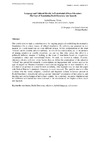Identificador persistente para citar o vincular este elemento:
https://accedacris.ulpgc.es/jspui/handle/10553/55579
| Campo DC | Valor | idioma |
|---|---|---|
| dc.contributor.author | Pascua Febles, Isabel | en_US |
| dc.date.accessioned | 2019-05-30T15:44:02Z | - |
| dc.date.available | 2019-05-30T15:44:02Z | - |
| dc.date.issued | 2018 | en_US |
| dc.identifier.issn | 2187-0616 | en_US |
| dc.identifier.uri | https://accedacris.ulpgc.es/handle/10553/55579 | - |
| dc.description.abstract | This article aims to make a contribution to the ongoing project of establishing the normative foundations for a critical theory of ethical translation. By defining our purposes in this manner, it is understood that we enter difficult terrain, for the interpretations of the word “ethical” can be unstable and even arbitrary. In view of this complication, and in the interests of aiming attention at specific objectives, we can say that what drives this effort is a politically-inflected manner of looking at the issue of translation based on progressive, emancipatory values and post-colonial theory. As such, our interest in culture, diversity, otherness, identity and other social factors that can define the connotations of the adjective “ethical” has guided this research; it contemplates an engagement with notions such as the type of impact the Western translator’s socio-cultural baggage has on their translation of a text that is the product of a non-Western sensibility. This explains why we start this paper with Roland Barthes’s statement, Language is never innocent. The specific aim is to offer evidence that the social, religious, historical and linguistic cultural references present in Buchi Emecheta’s postcolonial writings are not “innocent” constituents of her narrative, and that they are used as badges of her cultural identity. As a corollary, we assess whether or not her deliberate acceptation has been sustained in the translation of her English-African novel into Spanish. | en_US |
| dc.language | eng | en_US |
| dc.relation.ispartof | IAFOR Journal of Arts and Humanities | en_US |
| dc.source | IAFOR Journal of Arts and Humanities [ISSN 2187-0616], v. 5 (2), p. 69-79 | en_US |
| dc.subject | 5701 Lingüística aplicada | en_US |
| dc.subject.other | Translation | en_US |
| dc.subject.other | Buchi Emecheta | en_US |
| dc.subject.other | Otherness | en_US |
| dc.subject.other | Hybrid language | en_US |
| dc.subject.other | Culturemes | en_US |
| dc.title | Language and Cultural Identity in Postcolonial African Literature: The Case of Translating Buchi Emecheta into Spanish | en_US |
| dc.type | info:eu-repo/semantics/article | es |
| dc.type | Article | es |
| dc.identifier.doi | 10.22492/ijah.5.2.05 | en_US |
| dc.description.lastpage | 79 | - |
| dc.identifier.issue | 2 | - |
| dc.description.firstpage | 69 | - |
| dc.relation.volume | 5 | - |
| dc.investigacion | Artes y Humanidades | en_US |
| dc.type2 | Artículo | en_US |
| dc.identifier.ulpgc | Sí | es |
| item.grantfulltext | open | - |
| item.fulltext | Con texto completo | - |
| crisitem.author.dept | GIR Traducción e Interpretación, Interculturalidad, Lenguas Aplicadas y Literatura de Viajes | - |
| crisitem.author.orcid | 0000-0002-1595-4312 | - |
| crisitem.author.parentorg | Departamento de Filología Moderna, Traducción e Interpretación | - |
| crisitem.author.fullName | Pascua Febles, Isabel | - |
| Colección: | Artículos | |
Visitas
311
actualizado el 16-ene-2026
Descargas
463
actualizado el 16-ene-2026
Google ScholarTM
Verifica
Altmetric
Comparte
Exporta metadatos
Los elementos en ULPGC accedaCRIS están protegidos por derechos de autor con todos los derechos reservados, a menos que se indique lo contrario.
